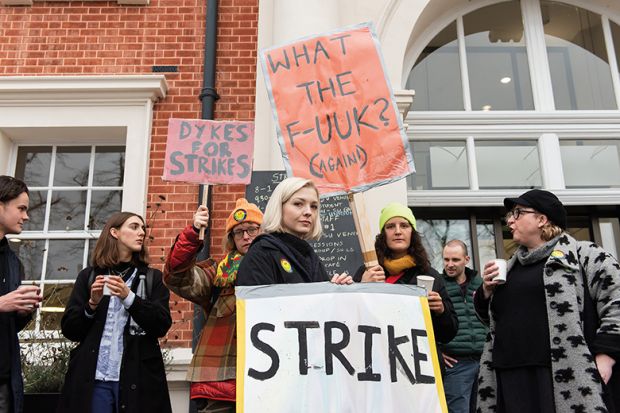Ten days of further strike action in disputes over pensions, pay and working conditions have been announced by the UK’s University and College Union.
More than 1 million students on 68 campuses are set to be affected by the strike, which is set to get under way on 14 February, according to the union, which said 50,000 staff were expected to down tools.
Last month, staff at 58 universities walked out for three days in rows over cuts to pensions provided by the Universities Superannuation Scheme and last year’s pay offer, and a further 10 branches have voted to join since then.
For the next round of action, the two disputes will be split, with the first five-day walkout focusing on the USS dispute and affecting 44 institutions, running from 14 to 18 February.
Branches that have a mandate for action on pay and working conditions only will join the walkout on 21 and 22 February, meaning that staff at all 68 institutions will be on the picket line.
The final three days of action, on the pay and working conditions dispute only, will run from 28 February to 2 March, affecting 63 universities.
The UCU also threatened a UK-wide marking and assessment boycott if the dispute is not solved. Other action short of a strike is ongoing, now including refusing to reschedule lectures or classes cancelled because of strike action.
Jo Grady, the UCU general secretary, said it was “a damning indictment of the way our universities are managed that staff are being left with no option but to walk out again”.
“Time is quickly running out for vice-chancellors to avert strike action, but it can be done. Staff need a proper pay rise, action to tackle insecure contracts, unsafe workloads and pay inequality, and for devastating pension cuts to be revoked. Any disruption that occurs will be the clearest indication yet that university bosses don’t value their staff,” Dr Grady said.
The latest round of the pensions dispute focuses on Universities UK’s plan to reduce the benefits provided by the USS in a bid to stave off increases in contributions that it describes as unaffordable.
The UCU has estimated that the reforms could cut employees’ guaranteed benefits by as much as 35 per cent, costing members thousands of pounds annually in retirement, but UUK’s figures suggest that the reduction is between 10 per cent and 18 per cent.
On 26 January, the UCU said it would be prepared to accept a time-limited increase in employee contributions to the USS scheme if this allowed for a new valuation to be conducted, claiming that this offered a “way out” of the dispute.
At the heart of the pay dispute is employers’ offer of a 1.5 per cent minimum rise for 2021-22, with unions demanding a £2,500 uplift instead, as well as action on inequality, casualisation and workload issues.
However, while concern among union members on these issues is widespread, the UCU leadership is also contending with continuing fatigue among members from the pandemic and years of industrial disputes, and concern over the impact on undergraduates who have seen their on-campus learning significantly interrupted. The union balloted 152 branches for action in total, but many fell short of the 50 per cent threshold that is legally required for industrial action in much of the UK.
A Universities UK spokeswoman claimed that just a third of UCU members eligible for industrial action last month actually went on strike – equivalent to just 9 per cent of total staff.
“Students will struggle to understand why they should bear the brunt of UCU’s refusal to confront the financial challenges facing all pension schemes,” the spokeswoman said.
“Instead of pursuing strike action and attempting to disrupt students’ education, the union should focus on working with employers to find a viable and affordable solution to the 2020 valuation which avoids the unaffordably high costs members and employers are facing from April.
“Universities will minimise the impact of any further industrial action on students by ensuring they can continue to learn and receive support.”
Raj Jethwa, chief executive of the Universities and Colleges Employers Association, said it was “disappointing for UCU to try to ask its members to take action again over the pay uplift from last August”.
“In terms of staff participation and teaching lost, the impact of industrial action so far has been fairly low in most [institutions], and below the levels seen in the 2019 dispute. Rather than continuing this disruption, UCU should engage constructively in this year’s multi-employer negotiating round, which is planned to begin at the end of March,” Mr Jethwa said.
The final day of strike action, on 2 March, will coincide with a student strike organised by the National Union of Students, calling for free higher education.




